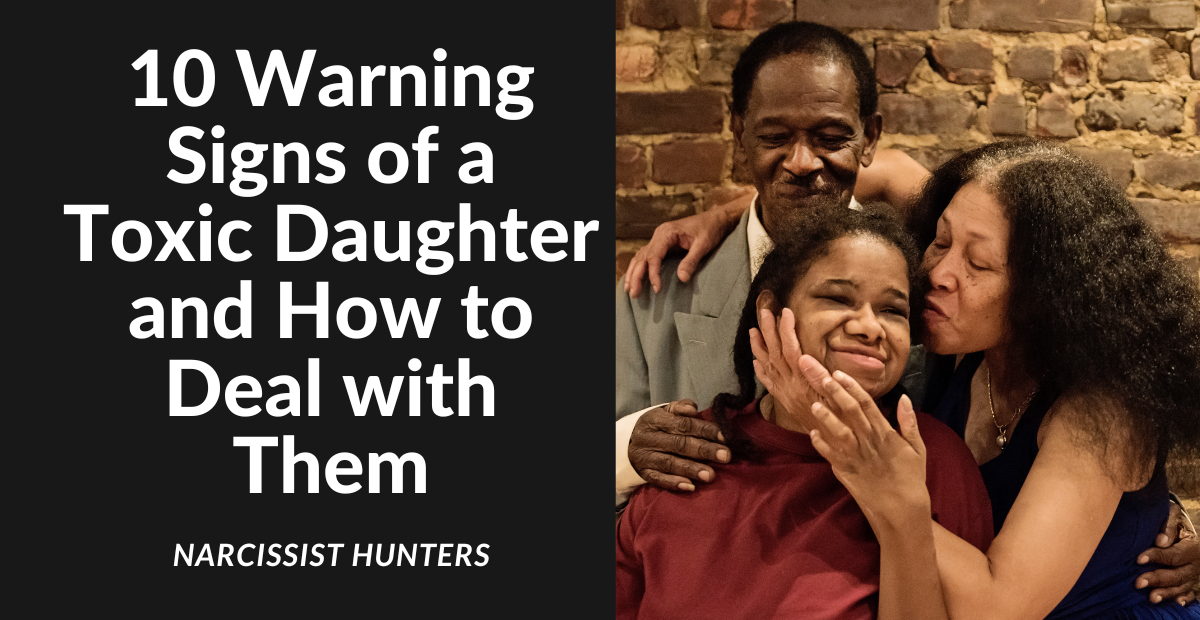Having a toxic relationship with a family member can be extremely challenging, especially when it involves your own daughter. While the bond between a parent and child is typically considered sacred, there are situations where daughters can exhibit toxic behaviors that can negatively impact the entire family dynamic.
In this article, we will explore the ten warning signs of a toxic daughter and provide effective strategies on how to deal with them.
By recognizing these signs of toxic daughter and implementing healthy coping mechanisms, parents can navigate this difficult situation and work towards healing and building healthier relationships within the family unit.

1. Excessive Criticism and Disrespect
One of the warning signs of a toxic daughter is excessive criticism and disrespect towards the parent. This can manifest in the form of constant belittling, name-calling, and demeaning remarks.
It is important to address this behavior early on and set boundaries to establish mutual respect. Communicate your feelings assertively and let your daughter know that disrespectful behavior is not acceptable.
2. Manipulative Tactics
Toxic daughters often employ manipulative tactics to get their way or control the dynamics within the family. They may use guilt, emotional blackmail, or passive-aggressive behavior to manipulate their parents.
It is crucial to recognize these tactics and not give in to them. Stand firm in your decisions and communicate clearly without succumbing to manipulation.
3. Lack of Empathy
A toxic daughter may display a lack of empathy towards others, especially towards their parents. They may dismiss or invalidate your feelings, making it difficult for you to communicate effectively with them.
It is important to address this issue and try to foster empathy by encouraging open and honest communication. Express how their behavior affects you and emphasize the importance of empathy in building healthy relationships.
4. Constant Need for Validation
Some toxic daughters constantly seek validation from their parents and rely on external sources to feel good about themselves. They may demand excessive praise and attention, leaving their parents feeling emotionally drained.
Encourage your daughter to develop self-confidence and self-worth from within. Help her recognize her own achievements and strengths, fostering independence and a healthy sense of self.
5. Controlling Behavior
Toxic daughters often exhibit controlling behavior, attempting to exert power and dominance over their parents. They may try to manipulate decisions, dictate rules, or interfere in personal matters.
It is essential to establish clear boundaries and assert your autonomy as a parent. Encourage open dialogue, but also make it clear that you have the final say in certain aspects of their life.
6. Emotional Volatility
Emotional volatility is another warning sign of a toxic daughter. They may have intense mood swings, going from extreme anger to excessive affection within a short span of time.
This emotional rollercoaster can be emotionally draining for parents and disrupt the stability of the family. Encourage your daughter to seek professional help to manage her emotions and develop healthier coping mechanisms.
7. Lack of Accountability
Toxic daughters often struggle with taking responsibility for their actions. They may blame others or make excuses for their behavior, avoiding accountability.
It is important to hold them accountable for their actions and teach them the importance of taking responsibility. Help them understand the consequences of their behavior and encourage them to make amends when necessary.
8. Constant Drama and Conflict
Toxic daughters thrive on drama and conflict, creating unnecessary tension within the family. They may instigate arguments, provoke emotional reactions, and escalate minor issues into major conflicts. It is crucial to stay calm and composed during such situations. Refuse to engage in unnecessary drama and focus on finding peaceful resolutions.
9. Lack of Boundaries
A toxic daughter may disregard personal boundaries, invading their parents’ privacy or manipulating their emotions.
Establishing clear boundaries is essential in maintaining a healthy relationship. Communicate your boundaries assertively and reinforce the importance of respecting each other’s personal space and emotional well-being.
10. Emotional and Physical Abuse
In extreme cases, toxic daughters may resort to emotional or even physical abuse towards their parents. This is a serious warning sign that should never be ignored. If you find yourself in an abusive situation, it is crucial to seek professional help immediately. Reach out to counselors, therapists, or support groups that can provide guidance and assistance in dealing with abuse.
How to Deal with a Toxic Daughter
Dealing with a toxic daughter can be emotionally challenging, but there are strategies that can help improve the situation and promote healing within the family. Here are some effective ways to deal with a toxic daughter:
- Seek professional help: A therapist or counselor can provide valuable guidance and support in navigating this complex relationship dynamic.
- Establish boundaries: Clearly define and communicate your boundaries to your daughter. Stick to these boundaries and reinforce their importance.
- Practice self-care: Take care of your own emotional and physical well-being. Engage in activities that bring you joy and help you recharge.
- Communicate assertively: Use “I” statements to express your feelings and concerns without attacking or blaming your daughter. Keep the lines of communication open while maintaining a calm and composed demeanor.
- Set consequences: Establish clear consequences for toxic behavior and follow through with them. This can help your daughter understand the impact of her actions.
- Focus on positive interactions: Encourage positive interactions and reinforce good behavior. Celebrate achievements and small steps towards healthier communication and relationships.
Frequently Asked Questions (FAQs) About Toxic Daughter
Can a toxic daughter change her behavior?
Yes, with self-awareness and professional help, a toxic daughter can change her behavior. However, it requires commitment, willingness, and consistent effort on her part.
Should I cut off contact with my toxic daughter?
Cutting off contact should be a last resort and considered only if the toxicity poses a significant threat to your well-being. Seek professional guidance before making such a decision.
Is it my fault that my daughter turned toxic?
No, it is not your fault. Toxic behavior is often influenced by various factors, including individual personality traits, past experiences, and external influences.
How can I rebuild a healthy relationship with my toxic daughter?
Rebuilding a healthy relationship requires time, effort, and patience. Seek professional guidance, practice empathy, and maintain open lines of communication to foster healing and understanding.
Can toxic behavior be unlearned?
Yes, toxic behavior can be unlearned through self-reflection, therapy, and personal growth. It takes time and effort to replace toxic patterns with healthier behaviors.
How can I take care of my own well-being while dealing with a toxic daughter?
Prioritize self-care by engaging in activities that bring you joy, seeking support from friends or support groups, and setting aside time for relaxation and rejuvenation
Last words
Dealing with a toxic daughter can be emotionally exhausting, but it is important to remember that you are not alone. By recognizing the warning signs of toxic daughter and implementing effective strategies, you can navigate this challenging situation and work towards building healthier relationships within your family.
Seek professional help when needed and prioritize your own well-being throughout the process. Remember, healing and growth are possible with time, effort, and commitment.
